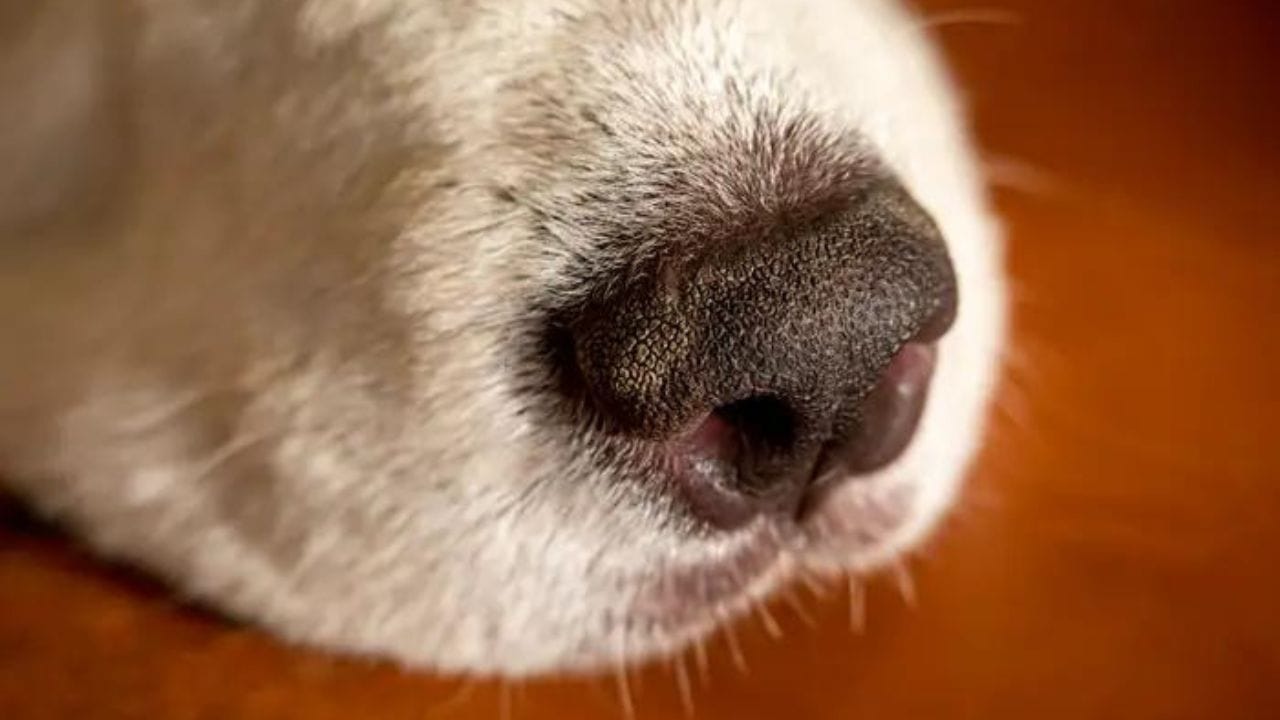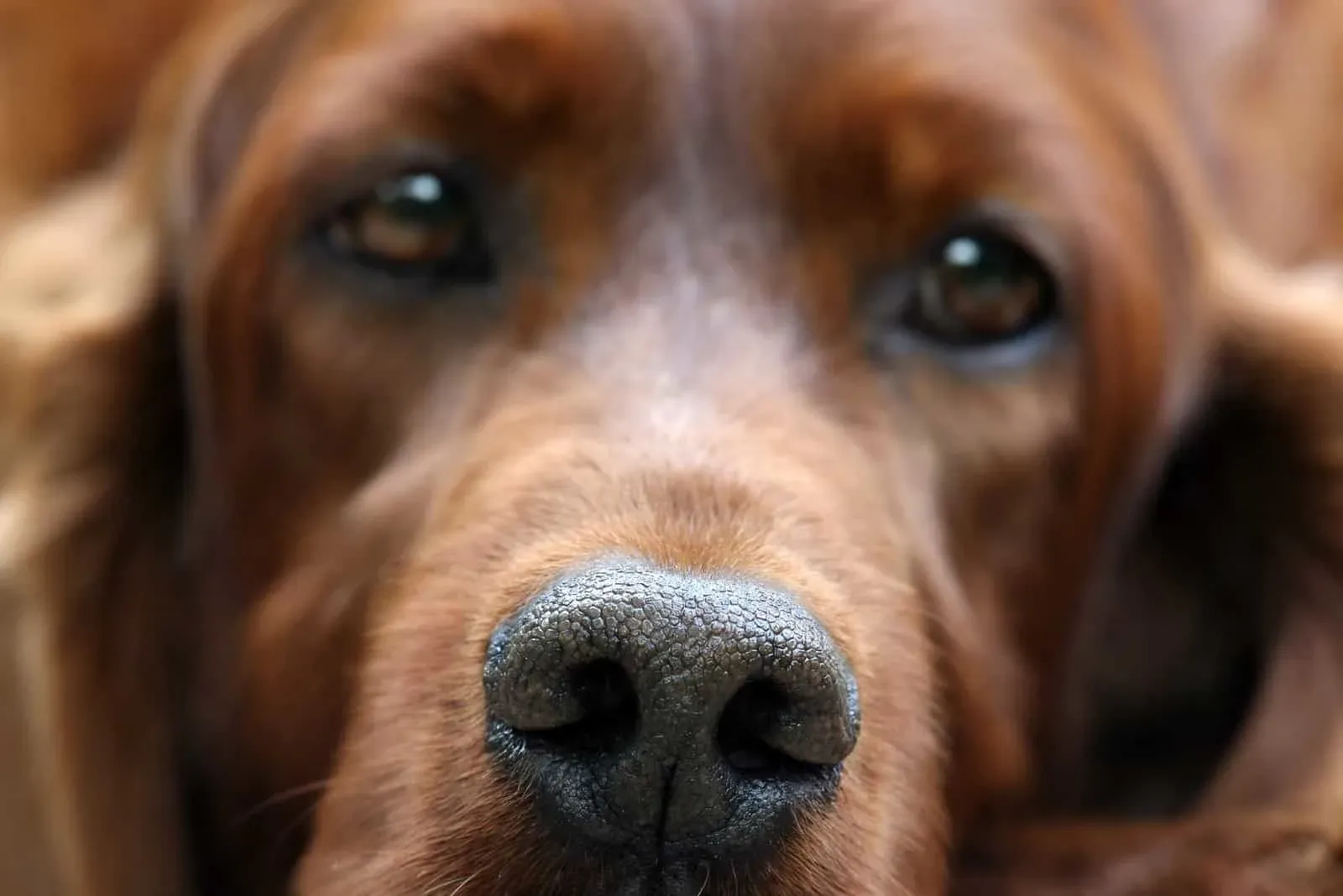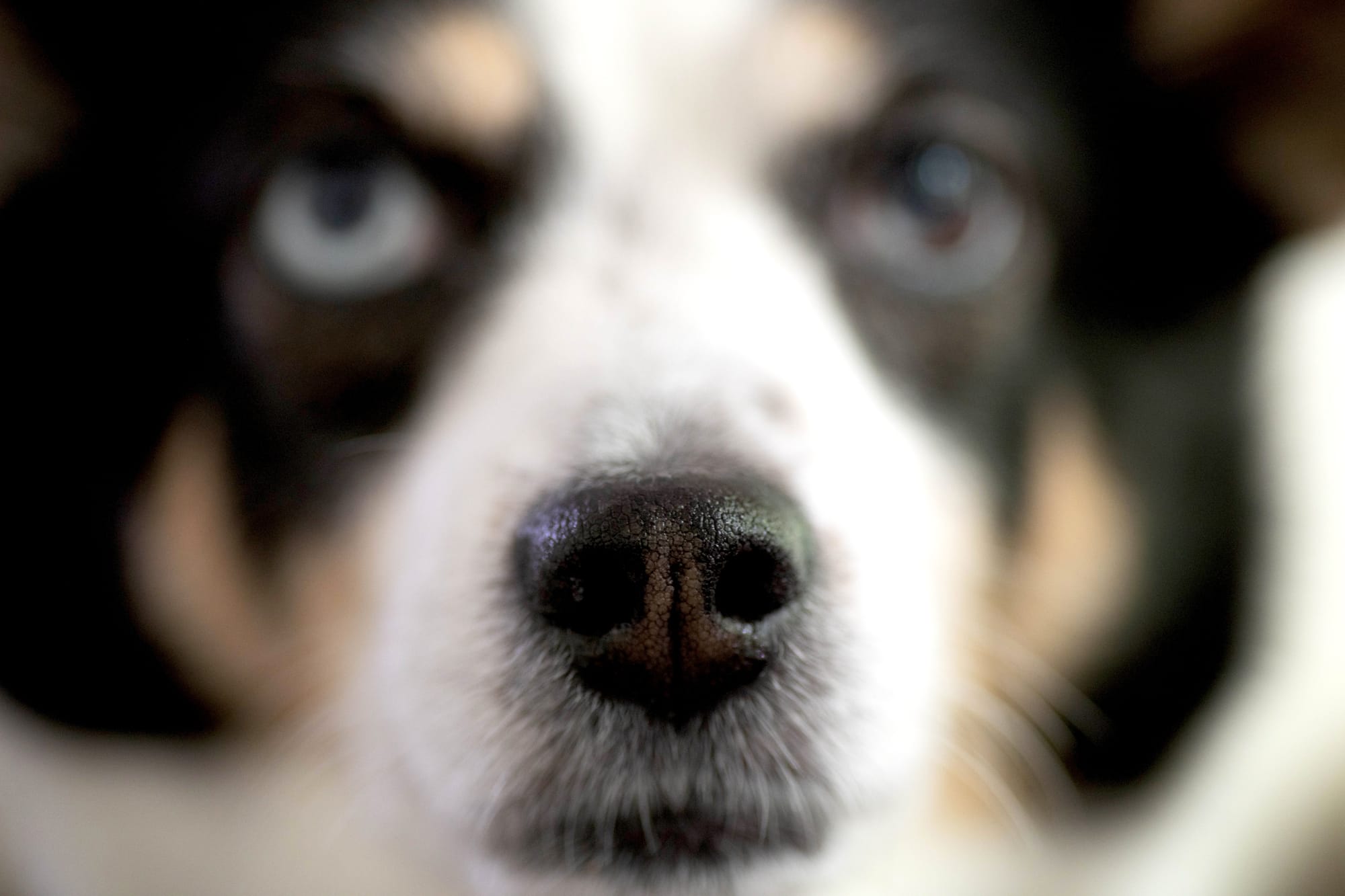Old Dog Dry Nose: Navigating Causes, Treatment, and Prevention
Old dog dry nose is a common problem among senior dogs. It is characterized by a dry, cracked, and sometimes bleeding nose, which can cause discomfort and pain for the dog. The condition can be caused by a variety of factors, including environmental factors, allergies, and medical conditions.

One of the most common causes of old dog dry nose is simply age. As dogs get older, their skin becomes less elastic and less able to retain moisture. This can lead to a dry, cracked nose, which can be especially problematic for dogs that spend a lot of time outdoors or in dry environments. Other factors that can contribute to the condition include allergies, which can cause inflammation and irritation of the nose, and medical conditions such as hypothyroidism or autoimmune disorders.
Understanding Dry Nose in Dogs
Dry nose is a common condition that affects dogs of all ages, breeds, and sizes. It is characterized by a lack of moisture on the nose, which can be caused by various factors. In this section, we will discuss the common causes of dry nose, the signs and symptoms, and the potential health implications.
Common Causes of Dry Nose
Dry nose in dogs can be caused by a variety of factors, including dehydration, environmental factors, sleep, age, breed, and climate. Dehydration is one of the most common causes of dry nose in dogs. When a dog does not drink enough water, the body will conserve water by reducing the amount of moisture produced by the nose.
Environmental factors such as dry air, dust, and pollutants can also cause dry nose in dogs. Sleeping in a dry environment can also lead to dry nose, especially if the dog sleeps with its nose against a dry surface.
Age and breed can also be factors in dry nose. Senior dogs are more prone to dry nose due to the aging process, while brachycephalic breeds such as bulldogs and cocker spaniels are more susceptible to dry nose due to their short snouts.
Signs and Symptoms
The signs and symptoms of dry nose in dogs include a dry, cracked, or flaky nose, as well as a lack of moisture on the nose. In severe cases, the nose may become painful and bleed. Dogs with dry nose may also be more prone to infections, as the lack of moisture can make it easier for bacteria and viruses to enter the body.

Potential Health Implications
While dry nose is generally not a serious condition, it can indicate underlying health issues. For example, if a dog is dehydrated, it may be a sign of kidney disease or diabetes. If a dog has a persistent dry nose, it is important to consult a veterinarian to rule out any underlying health issues.
In conclusion, dry nose is a common condition that can affect dogs of all ages, breeds, and sizes. By understanding the common causes, signs and symptoms, and potential health implications, dog owners can take steps to prevent and treat dry nose in their pets.
Medical Conditions Related to Dry Nose
Dry nose in dogs can be caused by various medical conditions. Some of these conditions are related to autoimmune diseases, skin conditions, infections, and allergies.
Autoimmune Diseases in Dogs
Autoimmune diseases occur when the immune system mistakenly attacks healthy cells in the body. In dogs, autoimmune diseases can affect various organs and tissues, including the skin and the nose. Lupus and pemphigus are two autoimmune diseases that can cause dry nose in dogs. Lupus is a chronic autoimmune disorder that can affect the skin, joints, and organs. Discoid lupus erythematosus (DLE) is a type of lupus that affects the skin, especially the nose and face. Pemphigus is another autoimmune disease that affects the skin and mucous membranes.
Nasal Hyperkeratosis and Other Skin Conditions
Nasal hyperkeratosis is a skin condition that causes the nose to become dry, crusty, and cracked. It occurs when the skin on the nose thickens and overgrows. Nasal hyperkeratosis can be a primary condition or a secondary condition caused by other underlying diseases. Other skin conditions that can cause dry nose in dogs include mucocutaneous pyoderma, a bacterial skin infection, and keratoconjunctivitis sicca, a condition that affects the tear glands and can cause dryness in the nose and other mucous membranes.
Infections and Allergies
Infections and allergies can also cause dry nose in dogs. Bacterial and fungal infections can affect the nasal passages and cause inflammation and dryness. Allergies to pollen, dust, and other environmental factors can cause nasal congestion, sneezing, and dryness. In some cases, allergies can also lead to secondary infections and exacerbate the symptoms of other underlying conditions.
In conclusion, dry nose in dogs can be caused by various medical conditions, including autoimmune diseases, skin conditions, infections, and allergies. It is important to identify and treat the underlying cause of dry nose to prevent further complications and improve the dog's quality of life.
Diagnosis and Treatment
Veterinary Diagnosis
Old dog dry nose can be diagnosed by a veterinarian during a physical examination. The vet will check for signs of dryness, cracking, and flaking of the nose. They may also check for any discharge or bleeding. In some cases, a biopsy may be necessary to rule out any underlying medical conditions.
Treatment Options and Home Care
Treatment for old dog dry nose may vary depending on the severity of the condition. In mild cases, simple home care may be enough to alleviate symptoms. This includes ensuring that the dog has access to plenty of water and avoiding exposure to harsh weather conditions.

In more severe cases, a veterinarian may prescribe medication such as steroids or antibiotics to help reduce inflammation and prevent infection. Prescription lotion may also be recommended to help moisturize and protect the nose.
In addition to medication, there are several home care options that can help alleviate symptoms of old dog dry nose. These include using a humidifier, applying a moisturizing balm or oil to the nose, and avoiding exposure to irritants such as chemicals or perfumes.
It is important to seek veterinary care if your dog's dry nose persists or if you notice any other symptoms such as bleeding or discharge. With proper diagnosis and treatment, most cases of old dog dry nose can be successfully managed.
Preventive Measures and Daily Care
Environmental Management
One of the most important factors in preventing dry nose in older dogs is environmental management. Keeping the air moist can help prevent the nose from becoming dry and cracked. This can be achieved by using a humidifier in the room where the dog spends most of its time. Additionally, avoiding exposure to direct sunlight and wind can also help prevent the nose from drying out.
Nose Care Products and Moisturizers
There are a variety of nose care products and moisturizers available that can help prevent and treat dry nose in older dogs. These products work by providing moisture to the nose, which helps prevent cracking and discomfort. Some popular options include nose balms, shea butter, petroleum jelly, and olive oil.
When selecting a moisturizer for your dog's nose, it is important to choose a product that is safe for dogs. Avoid using human moisturizers that contain ingredients that may be harmful to dogs. Additionally, it is important to avoid using products that contain alcohol, as this can further dry out the nose.
Coconut oil is another popular option for moisturizing a dog's nose. This natural oil contains keratin, which can help strengthen the skin and prevent cracking. However, it is important to use coconut oil sparingly, as too much can cause the nose to become greasy and attract dirt and debris.
Overall, daily moisturizing and nose care can help prevent and treat dry nose in older dogs. By using safe and effective products and practicing good environmental management, pet owners can help keep their furry friends comfortable and healthy.
Understanding Dog Behavior and Physiology
Normal Dog Nose Functionality
A dog's nose is a highly sophisticated organ that serves several functions. The moist surface of the nose helps to capture scent particles, which are then processed by the olfactory system. A wet nose enables dogs to detect scents more efficiently than a dry nose. Additionally, a dog's nose plays a crucial role in regulating the animal's body temperature.
Dogs also use their noses for communication and social interaction. They sniff each other to gather information about other dogs, such as their age, gender, and reproductive status. Dogs may also sniff their owners to detect changes in their emotional state or health.
Behavioral Indicators of Illness
A dry nose in dogs is not always a cause for concern, but it can be an indicator of illness. A dog's nose may become dry due to dehydration, allergies, or a viral or bacterial infection. If a dog's dry nose is accompanied by other symptoms, such as lethargy, loss of appetite, or difficulty breathing, it may be a sign of a more serious health issue.

Changes in a dog's behavior can also be a sign of illness. If a dog is sleeping more than usual, not eating or drinking, or avoiding exercise, it may be an indication of a health problem. Regular check-ups with a veterinarian can help to ensure that a dog is healthy and that any potential health issues are detected early.
Overall, understanding a dog's nose and behavior can provide valuable insights into a pet's health and well-being. By monitoring a dog's nose and behavior, pet owners can help to ensure that their furry friends are healthy and happy.
Recognizing When to Seek Help
If you notice your old dog has a dry, cracked nose, it's important to monitor their symptoms and seek help if necessary. Here are some signs that indicate it may be time to consult with a veterinarian.
Emergency Symptoms and Immediate Care
If your dog is experiencing any of the following symptoms, it's important to seek emergency veterinary care:
- Lethargy or weakness
- Pus or discharge from the nose
- Fever
- Scratching at the nose or face
- Vomiting or diarrhea
- Sneezing or coughing
- Flu-like symptoms
- Dry eye or excessive tearing
- Bleeding from the nose
If your dog is experiencing any of these symptoms, it's important to seek immediate veterinary care. Your veterinarian can help determine the underlying cause of your dog's symptoms and provide appropriate treatment.
Long-Term Health Monitoring
If your dog has a dry, cracked nose but is otherwise healthy, it's important to monitor their symptoms and seek veterinary care if their condition worsens. Some signs that your dog may need veterinary care include:
- Cracking or bleeding of the nose
- Blocked tear ducts
- Loss of appetite or anorexia
- Illness or illnesses that may affect the nose or respiratory system, such as kennel cough or pneumonia
- Boxers or other breeds that are prone to dry nose
Regular veterinary check-ups can help identify any potential health problems and ensure that your dog receives appropriate treatment. If you have any concerns about your dog's health, it's important to consult with a veterinarian.
Special Considerations for Specific Dog Breeds
When it comes to old dogs with dry noses, certain breeds may require special considerations. Bulldogs and other brachycephalic breeds, such as Boxers, are known for having respiratory issues which can lead to dehydration and dry noses. Owners of these breeds should monitor their dog's water intake and consider using a humidifier in their home to help keep their dog's nose moist.
Cocker Spaniels, on the other hand, are prone to allergies which can cause dryness and cracking of the nose. Owners of Cocker Spaniels should consider using a hypoallergenic diet and avoiding environmental triggers that may cause allergic reactions.
Labrador Retrievers are known for their love of swimming and spending time in the water. However, excessive swimming can lead to dryness and cracking of the nose. Owners of Labrador Retrievers should consider limiting their dog's time in the water and applying a protective balm to their dog's nose before and after swimming.
Regardless of breed, all old dogs may experience dryness and cracking of the nose as they age. It is important for owners to regularly monitor their dog's nose and provide appropriate care to prevent further discomfort. This may include using a moisturizing balm or ointment specifically designed for dogs, ensuring adequate hydration, and avoiding exposure to extreme temperatures and dry environments.
Seasonal Influences on Canine Health
Summer Care
During the summer months, dogs can be susceptible to sunburn, dehydration, and overheating. It is important to keep your dog cool and hydrated by providing plenty of water and access to shade. Dogs with light-colored fur or short hair are particularly susceptible to sunburn, so it is important to limit their exposure to direct sunlight.
Another common issue during the summer months is a warm, dry nose. This can be caused by the dry air and heat, and can lead to discomfort for your dog. To help alleviate this, you can provide your dog with a cool, moist towel to lay on or use a humidifier in your home.

Winter Challenges
During the winter months, dogs can face a whole new set of challenges. One of the biggest challenges is the dry air that comes from heating vents. This can cause your dog's nose to become dry and cracked, leading to discomfort and even nosebleeds.
To combat this issue, it is important to keep your home humidified and provide your dog with plenty of water. You can also use a nose balm or moisturizer to help soothe and protect your dog's nose.
In addition to dry air, dogs can also face challenges with the cold weather. It is important to limit your dog's exposure to the cold and provide them with a warm, dry place to rest. Dogs with short hair or little body fat may benefit from a coat or sweater to help keep them warm.
Overall, it is important to be aware of the seasonal influences on your dog's health and take steps to keep them comfortable and healthy throughout the year.
FAQs About Dog Dry Nose
Dog dry nose is a common issue that many pet parents face. Here are some frequently asked questions about dog dry nose:
What causes a dog's nose to become dry?
There are several reasons why a dog's nose may become dry. It could be due to dehydration, dry air, or even an allergic reaction to something in the environment. In some cases, it may be a sign of an underlying health issue such as keratoconjunctivitis sicca (KCS) or hereditary nasal parakeratosis.
Can anxiety cause a dog's nose to become dry?
Yes, anxiety can be a contributing factor to a dog's dry nose. When a dog is anxious, they may pant excessively, which can lead to dehydration and a dry nose. Additionally, stress can weaken a dog's immune system, making them more susceptible to infections that can cause dryness.
Is a dry nose a sign of fever in dogs?
Contrary to popular belief, a dry nose is not always a sign of a fever in dogs. A dog's nose can be dry due to a variety of reasons, and it is not a reliable indicator of their body temperature. To accurately determine if a dog has a fever, a rectal thermometer should be used.
How can dog dry nose be treated?
Treatment for dog dry nose depends on the underlying cause. If it is due to dehydration, ensuring that the dog has access to plenty of water can help. If it is due to an allergic reaction, removing the allergen from the environment may be necessary. In some cases, using a moisturizing balm or cream containing ingredients such as salicylic acid or vitamin E can help relieve dryness.
Can dog dry nose be prevented?
Preventing dog dry nose may not always be possible, but there are some steps pet parents can take to reduce the risk. Keeping the dog hydrated, providing a humidifier in dry environments, and avoiding exposure to allergens can all help prevent dryness. Additionally, regular grooming and cleaning of the face can help prevent overgrowth of skin cells that can contribute to dryness.
Conclusion
In conclusion, a dry nose in an old dog is a common occurrence and is not always a cause for concern. However, it is important to monitor the dog's behavior and overall health to ensure that there are no underlying issues causing the dry nose.
There are several factors that can contribute to a dry nose in an old dog, including dehydration, environmental factors, and medical conditions. By providing adequate hydration, keeping the dog in a comfortable environment, and seeking veterinary care when necessary, pet owners can help alleviate dry nose symptoms and ensure their dog's overall health and well-being.
It is important to note that while some home remedies may provide temporary relief, they are not a substitute for professional veterinary care. Pet owners should always consult with their veterinarian before administering any treatments or medications to their dog.
Overall, a dry nose in an old dog is a common occurrence that can usually be managed with proper care and attention. By staying informed and taking proactive steps to address dry nose symptoms, pet owners can help ensure their dog's continued health and happiness.